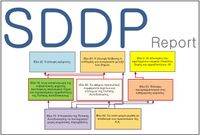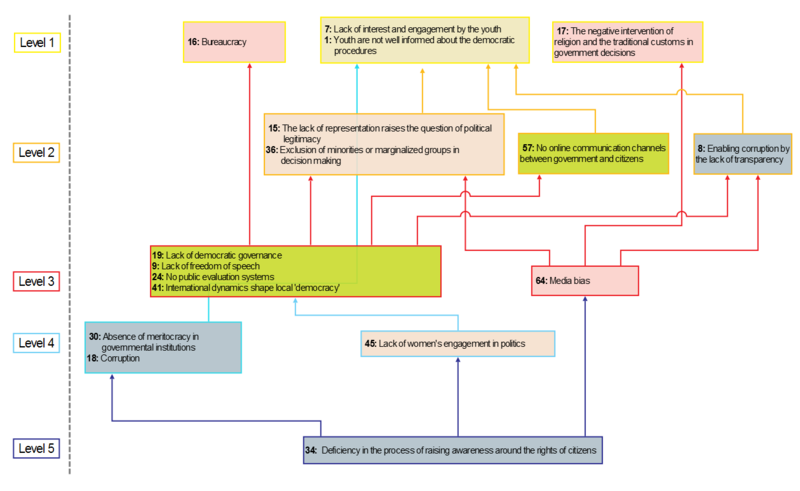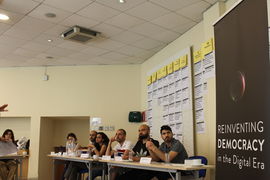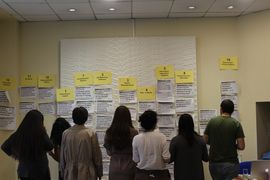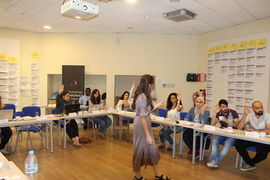SDDP Reinventing Democracy - Challenges (MENA Initiative): Difference between revisions
Jordankent (talk | contribs) |
Jordankent (talk | contribs) No edit summary |
||
| Line 2: | Line 2: | ||
|acronym=SDDP Reinventing Democracy in the Digital Era (UNDEF) Report | |acronym=SDDP Reinventing Democracy in the Digital Era (UNDEF) Report | ||
|book_image=SDDP_Report_Image.jpg | |book_image=SDDP_Report_Image.jpg | ||
|report_title= | |report_title= Reinventing Democracy in the Digital Era (UNDEF) Report | ||
|Triggering_Question= '''What are key shortcomings of our current systems of governance that could be improved through technology''' | |Triggering_Question= '''What are key shortcomings of our current systems of governance that could be improved through technology''' | ||
|project= | |project=Reinventing Democracy in the Digital Era (UNDEF) | ||
|author=[[Yiannis Laouris]] <br> [[Kevin Dye]] <br> | |author=[[Yiannis Laouris]] <br> [[Kevin Dye]] <br> Andreas Andreou <br> [[Eleni Philippou]] | ||
|editor= | |editor= | ||
|total_duration=800 person hrs | |total_duration=800 person hrs | ||
| Line 16: | Line 16: | ||
==Executive Summary== | ==Executive Summary== | ||
This paper reports the results of the second of a series of workshops organized by [[Future Worlds Center]] under the auspices of UNDEF. The dialogue was implemented in the context of the | This paper reports the results of the second of a series of workshops organized by [[Future Worlds Center]] under the auspices of UNDEF. The dialogue was implemented in the context of the '''Reinventing Democracy in the Digital Era (UNDEF)''' project. The purpose of this project was to bring together young people from all around the world in an attempt to take apart and reconstruct the concept of democracy. The workshop was organized using the structured dialogic design process (SDDP) approach within the context of a rich web-based communication environment. This Co-Laboratoty was organized using the Structured Democratic Dialogue Process (SDDP) approach within the context of a rich web-based communication environment. It is organized by the Middle East and Northern African Initiative. | ||
<br> | <br> | ||
<br> | <br> | ||
| Line 27: | Line 27: | ||
[[File: RD_MENA_Challenges_Map.png|thumbnail|center| | [[File: RD_MENA_Challenges_Map.png|thumbnail|center|800px|alt=Influence Map.|Influence tree from the Characteristics SDDP of the Reinventing Democracy workshop for TQ]] | ||
<br> | <br> | ||
Revision as of 00:38, 22 May 2018
|
Executive Summary
This paper reports the results of the second of a series of workshops organized by Future Worlds Center under the auspices of UNDEF. The dialogue was implemented in the context of the Reinventing Democracy in the Digital Era (UNDEF) project. The purpose of this project was to bring together young people from all around the world in an attempt to take apart and reconstruct the concept of democracy. The workshop was organized using the structured dialogic design process (SDDP) approach within the context of a rich web-based communication environment. This Co-Laboratoty was organized using the Structured Democratic Dialogue Process (SDDP) approach within the context of a rich web-based communication environment. It is organized by the Middle East and Northern African Initiative.
The Triggering Question (TQ) was
What are key shortcomings of our current systems of governance that could be improved through technology?
In response to the TQ, the 20 participants came up with 69 Actions, which were categorized in 16 clusters. Following the voting process, 27 ideas received one or more votes and 17 were structured to create the influence MAP shown below.
According to the participants of this workshop, the ideas that appear to be the most influential were:
- Challenge 34: Deficiency in the process of raising awareness around the rights of citizens
- Challenge 30: Absence of meritocracy in governmental institutions
- Challenge 18: Corruption
- Challenge 45: Lack of women's engagement in politics
Gallery
Participants
| Name | Country |
|---|---|
| Takwa Makhlouf | Tunisia |
| Ano Surmava | Georgia |
| Ethan Shafir | Israel |
| Houda Halwani | Lebanon |
| Omar Elmenofy | Bahrain |
| Eslam Elhossieny | Eygpt |
| Fatma Younis | Egypt |
| Ahmed Elsayed | Lebanon |
| Hazim Musleh | Palestine |
| Karim Chalhoub | Lebanon |
| Ayman Abu Aisheh | Palestine |
| Hassan Mahareeq | Palestine |
| Abedalrahman ALzghoul | Jordan |
| Manal Ibrahim | |
| Incinur Yilgin | Turkey |
| Bengisu Colak | Turkey |
| Rana Makki | |
| Hoda Touma | Lebanon |
| Deloris Saad | Lebanon |
| Ivi Solomou | Cyprus |
